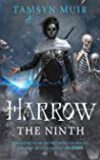
Gideon the Ninth was an absolutely wonderful book, a new favorite of mine. Which makes Harrow the Ninth all the harder to read–and especially review. This is going to be one of the most spoilery reviews I’ve ever written, but I think it’s necessary. If you don’t do spoilers: read the book. It’s worth it. But it’s going to be weird and confusing.
Don’t get me wrong. There is an absolute boatload to love about this book. The worldbuilding is still a fascinating combination of sci-fi and gothic (literally necromancers in space). The wording is still wonderful and weird and funny.
“I could protect you, if you’d only ask me to,” said Ianthe the First.
A tepid trickle of sweat ran down your ribs.
“I would rather have my tendons peeled from my body, one by one, and flossed to shreds over my broken bones,” you said. “I would rather be flayed alive and wrapped in salt. I would rather have my own digestive acid dripped into my eyes.”
“So what I’m hearing is … maybe,” said Ianthe. “Help me out here. Don’t be coy.”
We get far more into the weeds this time around, actually meeting ‘God’ and a few other ten thousand year old necromancers, digging into what it means to be a Lyctor, and really getting a feel for the larger universe that Harrow inhabits. Necromancy is a science and it’s excellent to see how it’s studied and built into an otherwise scifi world.
The Emperor said, “Harrowhark, what happens when somebody dies?”
…
“Apopneumatism. The spirit is forced from their body. The initial thanergy bloom occurs.”
“Why?”
“Thalergetic decay causes cellular death,” you said carefully, pressing the nail in harder, “which emits thanergy. The massive cell death that follows apopneumatism causes a thanergetic cascade, though the first bloom fades and the thanergy stabilises within thirty to sixty seconds.”
On the other hand, as I mentioned in my review of the first book, I did not like where the first book went with the death of Gideon , even if it was to save Harrow. Gideon was absolutely the best part of the first book, followed primarily by the relationship she had with Harrow. And in this book, for a rather long time… we don’t get Gideon at all. There’s a perfectly good reason for that– Harrow has quite literally rewritten her brain to try to forget what she did to Gideon --but that doesn’t make it any easier to read. If it was only a shorter part of the book, I would have liked it far more, but this doesn’t change for a solid 2/3 of the book…
On top of that, the tone, the plot, and the timeline is all sorts of confusing through this same part. There are parts in second person (I know, right?) and parts that aren’t. Some are set in space, some in ’the River’ (it’s magic), and some flashbacks to the first book ( only everything is different now ). It’s really hard to keep track of what in the world is going on and at times I was close to putting down the book entirely.
The entire process of seeing through Harrow’s eyes and learning what’s going on as she does is pretty much fascinating though. I’ll give you that. Take this, a note from harrow to herself:
GUIDELINE #7: EXAMINE IANTHE’S JAW AND TONGUE AFTER YOU READ THIS. Owing to her Lyctoral status this will require physical touch. Under no circumstances can you let her know you are examining them. Do whatever it takes. If you suspect either jaw or tongue has been replaced, DO NOT SWEAR THE OATH. Instead kill her immediately.
Wonderful.
On the other other hand (just pretend it’s a necromantic bone hand I’ve animated, they can totally do that), the last 1/3 of the book, once everything starts crashing together is absolutely phenomenal. You can finally get concrete answers on what’s going on, along with learning about some mysteries that even the characters hadn’t figured out until then. It’s really a worthy sequel to Gideon the Ninth, honestly even better in points. It really makes me want to see where the story goes next and I’m glad I stuck through.
Overall… it’s a mixed review. I wish the first part had been over sooner and that we could have gotten more of the second, but in the end, it’s still a very solid book. I do sorely hope and expect that the next book–whenever it comes out–will be more of the same.